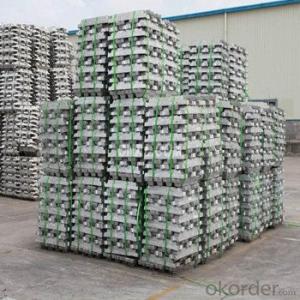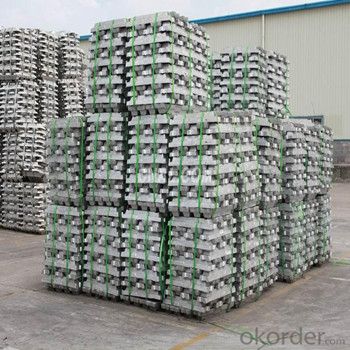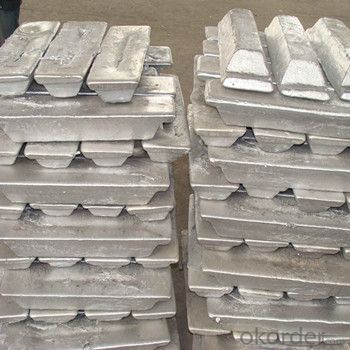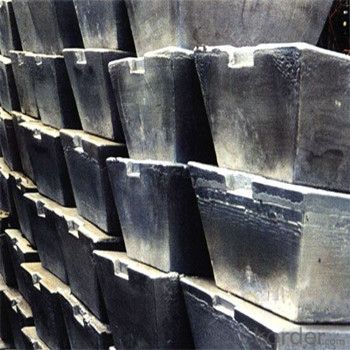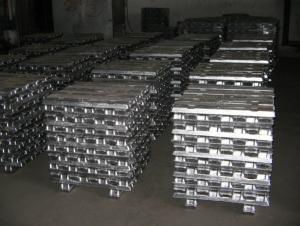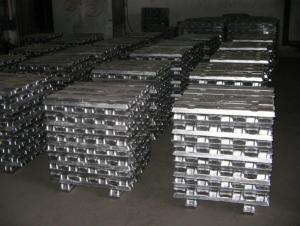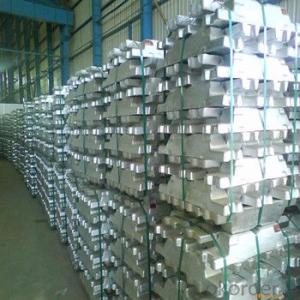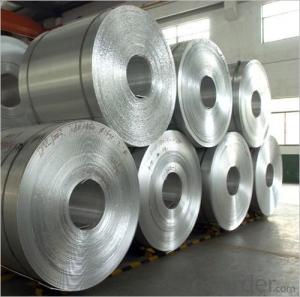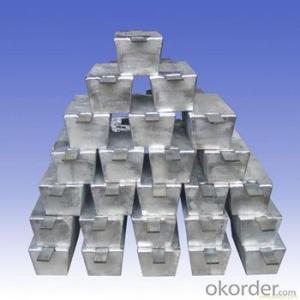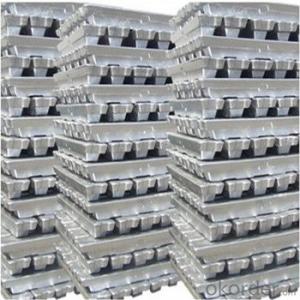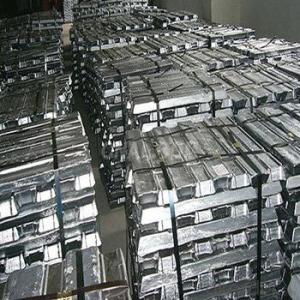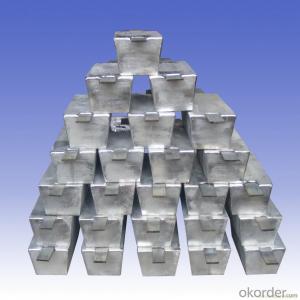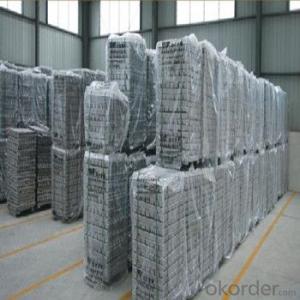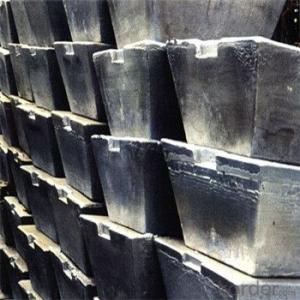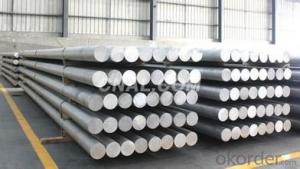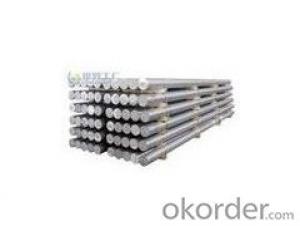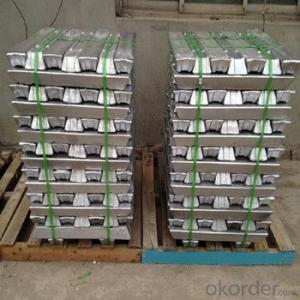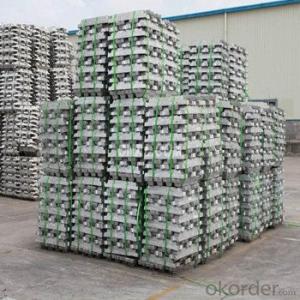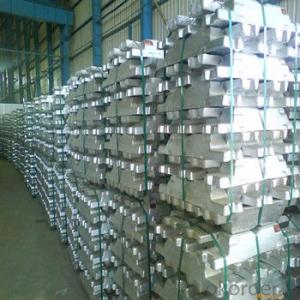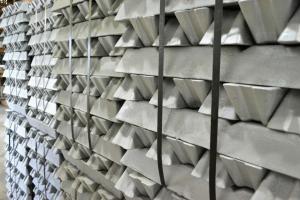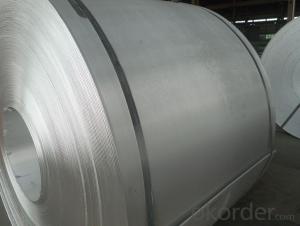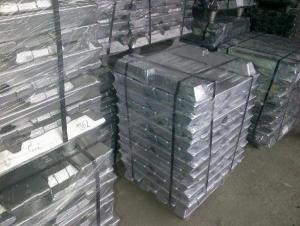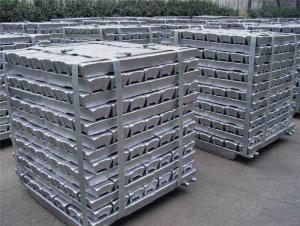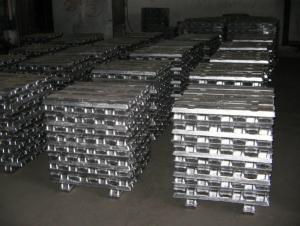Aluminum Ingot for Your Choice from China
- Loading Port:
- China main port
- Payment Terms:
- TT OR LC
- Min Order Qty:
- 1000 m.t.
- Supply Capability:
- 10000 m.t./month
OKorder Service Pledge
OKorder Financial Service
You Might Also Like
Pure Aluminum Ingot Used for Industry
1.Structure of Aluminum Ingot Description
Aluminum Ingot is with the AL as the main chemical composition. Aluminum Ingot is used for industry,such as automobile,pinning and weaving,electron broadly and so on.Aluminum Ingot has the following advantages: easy control and operation, fast melting.
2.Main Features of the Aluminum Ingot
•High Purity
•Easy control and operation
•High strength
•Fast melting
•Competitive price
•Best Service
3. Aluminum Ingot Images
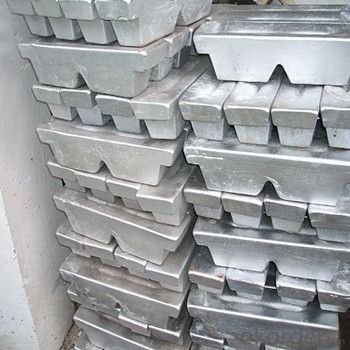
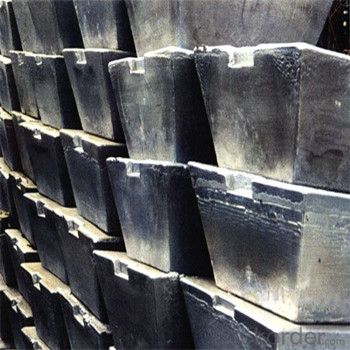
4. Aluminum Ingot Specification
Grade | Chemical Composition % | |||||||||
Al≥ | impurities ≤ | |||||||||
Si | Fe | Cu | Ga | Mg | Zn | Mn | others | Sum | ||
Al99.9 | 99.90 | 0.50 | 0.07 | 0.005 | 0.02 | 0.01 | 0.025 | - | 0.010 | 0.10 |
Al99.85 | 99.85 | 0.80 | 0.12 | 0.005 | 0.03 | 0.02 | 0.030 | - | 0.015 | 0.15 |
Al99.7 | 99.70 | 0.10 | 0.20 | 0.010 | 0.03 | 0.02 | 0.030 | - | 0.030 | 0.30 |
Al99.6 | 99.60 | 0.16 | 0.25 | 0.010 | 0.03 | 0.03 | 0.030 | - | 0.030 | 0.40 |
Al99.5 | 99.50 | 0.22 | 0.30 | 0.020 | 0.03 | 0.05 | 0.050 | - | 0.030 | 0.50 |
Al99.00 | 99.00 | 0.42 | 0.50 | 0.020 | 0.03 | 0.05 | 0.050 | - | 0.050 | 1.00 |
5.FAQ of Aluminum Ingot
We have organized several common questions for our clients,may help you sincerely:
①How about your company?
A world class manufacturer & supplier of castings forging in carbon steel and alloy steel,is one of the large-scale professional investment casting production bases in China,consisting of both casting foundry forging and machining factory. Annually more than 8000 tons Precision casting and forging parts are exported to markets in Europe,America and Japan. OEM casting and forging service available according to customer’s requirements.
②How to guarantee the quality of the products?
We have established the international advanced quality management system,every link from raw material to final product we have strict quality test;We resolutely put an end to unqualified products flowing into the market. At the same time, we will provide necessary follow-up service assurance.
③How long can we receive the product after purchase?
In the purchase of product within three working days, We will arrange the factory delivery as soon as possible. The pecific time of receiving is related to the state and position of customers.Commonly 7 to 10 working days can be served.
- Q: What are the common defects found in aluminum ingots?
- Common defects found in aluminum ingots include shrinkage porosity, hot tearing, gas porosity, inclusions, segregation, and surface cracks. These defects can negatively impact the quality and mechanical properties of the aluminum ingots, leading to potential issues during subsequent processing and manufacturing.
- Q: What are the environmental impacts of producing aluminum ingots?
- The production of aluminum ingots has various environmental impacts. Firstly, the extraction of bauxite, the primary ore used in aluminum production, often involves deforestation and habitat destruction. Additionally, the refining process requires significant energy inputs, contributing to greenhouse gas emissions and air pollution. The discharge of toxic chemicals and heavy metals during refining can also contaminate soil and water sources. Lastly, the disposal of waste materials such as red mud can pose further environmental challenges.
- Q: How are defects in aluminum ingots repaired?
- Depending on the type and severity of defects, there are several methods available for repairing aluminum ingots. One commonly used technique is remelting, where the flawed ingot is melted down and recast to eliminate any impurities or defects. Through this process, the metal is refined and the original defects are eradicated. Another method, known as hot working, is employed to repair defects in aluminum ingots. This involves heating the ingot to a specific temperature and subjecting it to mechanical processes such as rolling, forging, or extrusion. Hot working effectively reshapes the metal, redistributes the defects, and enhances the overall quality of the ingot. Heat treatment is an additional process that can be utilized to repair defects in aluminum ingots. By subjecting the ingot to controlled heating and cooling cycles, its microstructure is altered, and defects like cracks or voids are eliminated. Heat treatment improves the mechanical properties and structural integrity of the ingot, rendering it suitable for various applications. Furthermore, defects in aluminum ingots can be rectified through welding or surface machining. Welding is particularly effective for repairing cracks or fractures, while surface machining can eliminate surface defects like dents or scratches. It is worth noting that the choice of repair method depends on the nature and extent of the defect, as well as the intended application of the aluminum ingot. Manufacturers and specialists in aluminum production and processing employ diverse techniques to ensure that defects are successfully repaired, resulting in high-quality aluminum products.
- Q: The difference between pure aluminium ingot and aluminium alloy ingotToday I know, aluminum ingot is also divided into pure aluminum ingot, aluminum alloy ingot, what is the difference between them?
- Aluminum Alloy: YISHION and recovery of aluminum ingot aluminum as raw material, in accordance with international standards or special requirements add other elements, such as: GUI (Si), copper (Cu), magnesium (Mg), iron (Fe)... To improve the casting, chemical and physical properties of pure aluminum. The alloy is suitable for casting and can make the casting work well
- Q: How much does it cost to process the aluminum ingots into T5-6063 models? Now, what about costing the aluminum ingot or the aluminum bar?
- 6063 is the alloy brand, T5 by the high temperature forming process cooling, and then the artificial aging stateThe utility model is suitable for artificial aging products after being cooled by the high temperature forming process without being cold processed (which can be straightened and straightened without affecting the mechanical performance limit)
- Q: What is the process for smelting aluminum ingots?
- The process for smelting aluminum ingots involves several steps. First, bauxite ore, which is the primary source of aluminum, is mined and refined to remove impurities. The refined bauxite is then transformed into alumina through a process called the Bayer process. Next, the alumina is mixed with cryolite and other additives in a large electric furnace. This mixture is heated to extremely high temperatures, reaching around 1,800 degrees Celsius. The intense heat causes the alumina to melt and separate into aluminum and oxygen. The molten aluminum is then tapped from the furnace and transferred to a holding furnace or a ladle. During this stage, the aluminum is often alloyed with other metals to enhance its properties. Common alloying elements include magnesium, silicon, copper, and zinc. Once the desired alloy composition is achieved, the molten aluminum is poured into molds to form ingots. These molds are typically made of steel and can vary in size and shape depending on the specific requirements. After the aluminum has solidified and cooled, the ingots are removed from the molds and undergo further processing, such as heat treatment or rolling, to achieve the desired mechanical properties and shape. Overall, the process of smelting aluminum ingots involves mining and refining bauxite, transforming it into alumina, melting the alumina to separate aluminum and oxygen, alloying the molten aluminum, pouring it into molds, and finally processing the solidified ingots to achieve the desired properties.
- Q: How are aluminum ingots tested for quality?
- Aluminum ingots are tested for quality through a series of quality control measures. These include visual inspections to check for any surface defects or impurities, measurements of dimensions and weight to ensure they meet the required specifications, and chemical composition analysis to verify the purity and alloy composition. Additionally, mechanical tests such as hardness and tensile strength assessments may be conducted to evaluate the ingot's structural integrity. These rigorous testing procedures ensure that only high-quality aluminum ingots are released for further processing and manufacturing.
- Q: How are aluminum ingots used in the production of window frames?
- The production of window frames heavily relies on aluminum ingots, which play a crucial role. To begin with, these ingots are melted and shaped according to the specific requirements of the frames. The melting process involves heating the ingots in a furnace until they reach their melting point of approximately 660 degrees Celsius. Once the aluminum is molten, it is poured into molds designed to achieve the desired shape of the window frame. Afterward, the molten aluminum is left to cool and solidify, resulting in a solid frame made of aluminum. The choice of aluminum ingots for this process is due to their exceptional properties. Aluminum is not only lightweight but also sturdy and durable, making it an ideal material for window frame production. Additionally, its corrosion-resistant nature is particularly important for outdoor window frames exposed to diverse weather conditions. Once the aluminum frames have solidified, they undergo further processes to meet the specific requirements and design of each window frame. These processes may include cutting, shaping, and finishing, which often require the use of specialized tools and machinery. They are necessary to create the appropriate openings for glass panels, hinges, locks, and other hardware. After the necessary modifications, the window frames are typically coated with protective finishes, such as powder coating or anodizing, to enhance both their appearance and durability. These finishes serve as an additional layer of protection against corrosion, ensuring that the frames can withstand years of use without deteriorating. In conclusion, aluminum ingots are indispensable in the production of window frames. They are melted, shaped, and further processed to create frames that are lightweight, sturdy, and resistant to corrosion. Furthermore, the frames undergo coating and finishing processes to enhance their visual appeal and longevity.
- Q: How to calculate the price with or without ticket in the aluminum ingot trade? Does the invoice price increase with aluminum?
- The difference between the price of the ticket and the price without the ticket is between the price of the ticket and the price of the ticket without the price of the ticket.
- Q: Can aluminum ingots corrode?
- Yes, aluminum ingots can corrode. Although aluminum is known for its corrosion resistance, it is not completely immune to corrosion. When exposed to certain environments, such as salty or acidic conditions, aluminum can undergo a process called oxidation, which results in the formation of a thin layer of aluminum oxide on its surface. This layer acts as a protective barrier, preventing further corrosion. However, if this layer is damaged or compromised, the underlying aluminum can be exposed to corrosive elements, leading to corrosion. Therefore, while aluminum ingots are generally resistant to corrosion, proper care must be taken to protect them in corrosive environments.
Send your message to us
Aluminum Ingot for Your Choice from China
- Loading Port:
- China main port
- Payment Terms:
- TT OR LC
- Min Order Qty:
- 1000 m.t.
- Supply Capability:
- 10000 m.t./month
OKorder Service Pledge
OKorder Financial Service
Similar products
Hot products
Hot Searches
Related keywords
